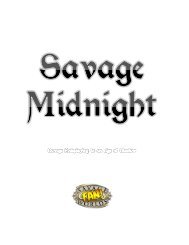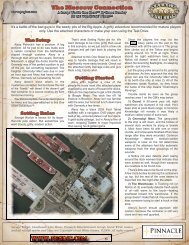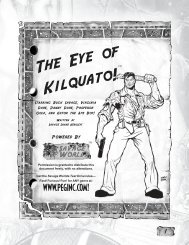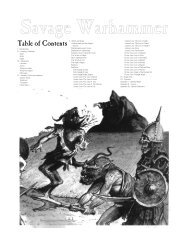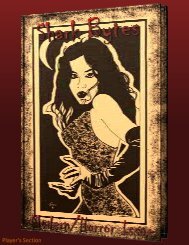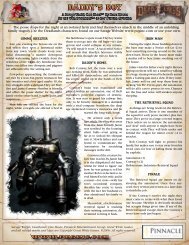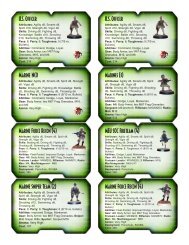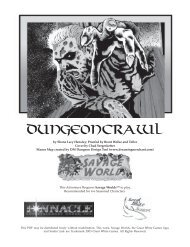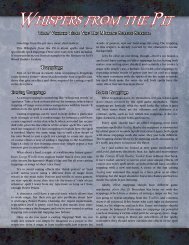IN THIS ISSUE: - Savagepedia
IN THIS ISSUE: - Savagepedia
IN THIS ISSUE: - Savagepedia
You also want an ePaper? Increase the reach of your titles
YUMPU automatically turns print PDFs into web optimized ePapers that Google loves.
Roleplaying in Poland<br />
Piotr Korys and Stopersson give us a peek into their world…<br />
While not a complete novelty in Poland,<br />
roleplaying games are a relatively new<br />
phenomenon. The first articles concerning<br />
these “strange games” were written by Jacek<br />
Ciesielski and appeared in the magazines<br />
Razem and Magazyn Razem in 1986. Bimonthly<br />
articles continued to be published until<br />
1989. Ciesielski wrote about the history of<br />
roleplaying behind the Iron Curtain, explained<br />
the concepts underlying the various games,<br />
and provided reviews of the most popular<br />
games. He hoped that someday, these games<br />
would be readily available in Poland.<br />
Unfortunately, his hope was not to be fulfilled<br />
for quite some time.<br />
During the late 80’s, a few companies<br />
started to publish fantasy and sci-fi board<br />
games and paragraph games such as Goblin<br />
and Dreszcz. Reviews of new board games and<br />
their connections to RPGs were first explored<br />
in Fantastyka (1984)—a well known polish fantasy/sci-fi magazine. Issue #6 (1988) sported full-color pages and featured<br />
a gallery of painted miniatures and dioramas. Fantastyka was the first magazine to publish RPG-related stories. The saga<br />
of Gotrek and Feliks by William King being the most notable to see print.<br />
After the fall of communism, the RPG market received more attention than it ever had in previous years. In March,<br />
1990, the magazine Fenix published a shortened version of a role playing game by Andrzej Sapkowski. The expanded<br />
version was published several years later as Magia i Miecz, and then as a book titled Oko Yrrhedesa. Unfortunately, this<br />
was all that an RPG fan could get in those days as far as “locally authored” games were concerned. Local shops didn’t<br />
sell many of the games that would have been popular with gamers outside of Poland, and the only way you could get<br />
your hands on these much sought after items was to order them from foreign shops—an expensive option at the time.<br />
Most of the RPG books available to the average Polish gamer were illegal photocopies. Besides availability, another<br />
barrier standing between the intrepid gamer and his game was that of language—very few people could read English, let<br />
alone translate it into Polish. The communist government had effectively banned the population from learning English for<br />
nearly 50 years!<br />
Everything changed on March 21, 1993. The first issue of Magia i Miecz (Sword and Sorcery) magazine was<br />
published, making it the first periodical strictly dedicated to roleplaying games. The issue was dedicated to Kryształy<br />
Czasu (Crystals of Time)—the first “official” Polish RPG. Kryształy Czasu was authored by Artur Szyndler, and based<br />
heavily on AD&D. March 21st was also the day on which the publishing house, Mag, opened its doors. This company<br />
worked very hard to increase public awareness of Polish RPGs. After Magia i Miecz, other RPG periodicals appeared on<br />
the Polish market: Złoty Smok (Golden Dragon) died after four issues; Talizman and Nowy Talizman lasted a few issues<br />
longer, and Legenda a magazine dedicated to Vampire: The Masquerade rounded out the first batch of magazines to hit<br />
the streets.<br />
Since 1993, more and more RPGs began showing up in Poland. With the increased availability of RPGs came the<br />
inevitable public outcry from those who were less informed about what the hobby actually involved. In 1995, Słowo (a<br />
Catholic journal), started an anti-RPG campaign. They used quotes and commentaries, taken from gaming sessions and<br />
other sources, but reported them completely out of context. Gamers were accused of being witches, Satanists and<br />
occultists. The article started a real witch hunt—to be honest, I was one of victims—I had trouble in school because of my<br />
involvement with RPGs. A few other newspapers and magazines wrote bad things about both the games and those that<br />
played them. The best known story was from a popular television program, in which a person who, by his own<br />
admission, had never played an RPG, blamed roleplaying games for all his misfortunes! Now, eleven years later, things<br />
are much better. However, in Poland, RPGs are still not readily available and the detractors still exist. I suspect, given<br />
time, things will improve, but what’s a Polish Savage to do until then. Stay Savage, I guess! And, of course, we are still<br />
waiting for Shane Lacy Hensley; he promised to take a vacation in Poland!<br />
Shark Bytes #2 - October 2004 14




